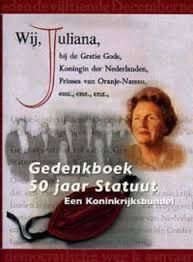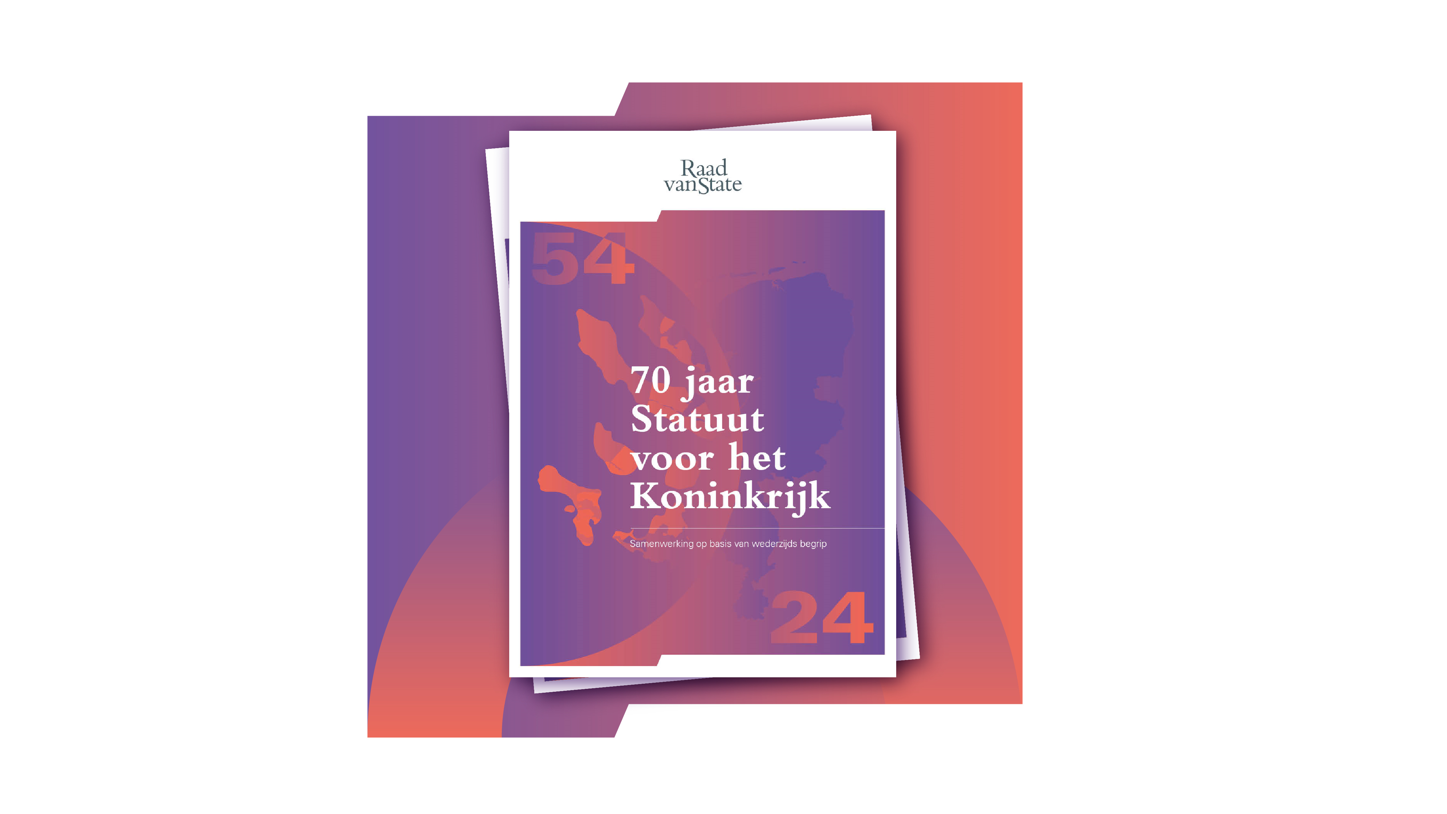Reflecting on 70 Years of the Charter for the Kingdom of the Netherlands
This week, the Council of State presented an important report ahead of the 70th anniversary of the Charter for the Kingdom of the Netherlands, which will be celebrated on December 15th, 2024. Known as “Statuut voor het Koninkrijk der Nederlanden” or in short “Statuut”, this foundational document, signed in 1954, established the legal framework for the relationships between the Netherlands and its Caribbean territories, including Aruba, Curaçao, and Sint Maarten. Originally, Suriname was also part of this framework until gaining independence in 1975.
In light of this milestone, we reflect not only on the past but also on how the charter has evolved over the decades and what it means for the future of the Kingdom.
A Milestone of Modernization and Autonomy
The Charter for the Kingdom marked a significant step toward modernizing the Kingdom’s political structure, shifting away from a colonial system and moving toward one of mutual respect and autonomy. The charter granted autonomy to the Caribbean territories while maintaining unity in defense, foreign policy, and citizenship. Over time, the Kingdom evolved, with major milestones such as Suriname’s independence in 1975, Aruba’s status aparte in 1986, and the dissolution of the Netherlands Antilles in 2010, which led to the current structure where Aruba, Curaçao, and Sint Maarten are autonomous countries, while Bonaire, Sint Eustatius, and Saba became special municipalities within the Netherlands. On a side note, I was one of the youngsters who were gathered in front of the government building at midnight on December 31st, 1985, escorted by my mother, to celebrate and welcome the beginning of our Status Aparte.
Insights from the Gedenkboek: 50 Years of the Charter
In 2004, to mark the 50th anniversary of the charter, the book “ Gedenkboek 50 jaar Statuut – Een Koninkrijksbundel“ was published. This volume brought together contributions from experts with diverse backgrounds, including scholars, legal experts, and government officials, to reflect on the Charter for the Kingdom’s past, present, and future. The fifty (50) articles examined the legal and constitutional relationships within the Kingdom and extended to former parts of the Kingdom, such as Suriname and Indonesia.

Key discussions in the book centered on the democratic deficit, the legal possibilities and limitations of the charter, and various social and historical events, such as the 1969 unrest in Curaçao and the evolution of Aruba’s status aparte. The book didn’t just celebrate the charter; it also critically assessed its content and functionality, making it clear that it would remain a subject of debate and discussion for years.
The Gedenkboek highlighted how the charter was instrumental in establishing a new legal order of equality between the Netherlands, the Caribbean territories, and Suriname. However, it also underscored the ongoing tensions in the constitutional arrangements and governance within the Kingdom, as explored in more detail in the Council of State’s opinion.
Looking Back at 50 Years: Gedenkboek 50 Jaar Statuut
Twenty years ago, I had the privilege of leading the celebration of the 50th anniversary of the charter by pushing a collaboration that led to the publication of “Gedenkboek 50 jaar Statuut – Een Koninkrijksbundel”. This book, published by the Gomez & Bikker Foundation, Editorial Charuba, and my alma mater Universiteit van Aruba, brought together 50 articles from authors across the Kingdom, reflecting on the charter’s past, present, and future. The editors were drs. Annemiek van Vliet, drs. F.R. Sint Jago, mr. Jurriaan de Haan, and mr. Luciano Milliard – driven by the powerhouse Alice van Romondt, worked tirelessly to curate a collection that captured diverse perspectives from all corners of the Kingdom. To my fellow editors, I extend a heartfelt thank you for your cooperation and dedication to this project, which was started by a group of friends philosophizing one day under a tree. Our work remains a valuable part of the historical record of the charter, and its insights continue to resonate today.
The Council of State’s Opiniont: A Reflection on 70 Years
Fast forward to today, as the Council of State’s opinion takes stock of the charter’s journey over 70 years. The report is divided into six chapters and provides a comprehensive analysis of the strengths and challenges of the Kingdom as it stands today. The report’s summaries are presented in English, Papiamento, and Papiamentu, reflecting the rich linguistic diversity of the Kingdom. This inclusion is a powerful reminder of the cultural and linguistic identities that coexist within the Kingdom, reinforcing the importance of mutual understanding and respect among its members. The website of the Council of State includes an introductory video from the vice president, Th. C (Thom) de Graaf.

Benefits, Tensions, and Areas for Improvement
One of the key themes in the Council of State’s report is the dual nature of the relationships within the Kingdom – one of mutual benefit but also tension. While the Caribbean territories have benefitted from their association with the Netherlands in areas such as infrastructure, education, and economic stability, there have been moments of friction, particularly regarding governance and autonomy. The report notes that while the charter has provided a robust framework for cooperation, there are areas where improvements can be made, especially in addressing governance challenges in the Caribbean territories and fostering a more balanced relationship.
The Role of Consensus Laws
The report highlights the importance of consensus laws (rijkswetten), which allow the territories and the Netherlands to collaborate on key legal matters. However, it also points out the hesitancy of some territories to engage in these laws, often due to concerns about unequal power dynamics during the legislative process. The Council of State recommends clearer procedures to ensure that all parties feel their voices are heard and that consensus reflects shared interests.
Protecting Human Rights and Ensuring Good Governance
A critical aspect of the charter is the protection of human rights and the promotion of good governance. The report emphasizes that the focus should be preventive cooperation instead of resorting to unilateral intervention from the Netherlands when governance issues arise in the Caribbean territories. By working together to build stronger governance systems, the Kingdom can address challenges before they escalate, ensuring that all parts of the Kingdom function effectively.
Addressing the Democratic Deficit
The Council of State also addresses the democratic deficit. Currently, citizens of the Caribbean territories do not have full representation in Dutch parliamentary elections, even though decisions made in the Netherlands directly impact their lives. The report calls for reforms to address this imbalance, ensuring that all citizens of the Kingdom have a voice in its governance and that the relationship between the territories and the Netherlands is more equitable.
Looking Ahead: A Call for Unity
As we approach the 70th anniversary of the charter, it’s clear that while the Charter for the Kingdom remains a vital framework, it must continue to evolve to meet the challenges of the 21st century. Much like the reflections we published in the 50th-anniversary book, the Council of State’s report emphasizes the need for deeper cooperation, mutual respect, and a focus on the values that unite us rather than the issues that divide us.

A Personal Reflection: The Strength of Unity
On a personal note, I am reminded of the power and potential of our Kingdom when we all join forces and align our efforts. The Kingdom is at its strongest when we focus on what we share – a commitment to good governance, human rights, and cooperation – and set aside the differences that may, sometimes, pull us apart. Over the years, I have been blessed to work with and befriend colleagues and peers across the Kingdom, all of whom believe in and share a deep passion for strengthening and unifying our Kingdom.
As we celebrate 70 years of the Charter for the Kingdom, let’s cherish the bonds that tie us together and continue to focus on what we have in common. Long live the Kingdom of the Netherlands, and long live the King!
Thank you for reading. I look forward to seeing you next week. Don’t forget to visit lincolngomez.com for more blogs and podcasts!












